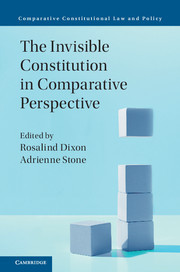Description
The Invisible Constitution in Comparative Perspective
Comparative Constitutional Law and Policy Series
Coordinators: Dixon Rosalind, Stone Adrienne
Will help its audience gain an understanding of the dimensions to contemporary constitutions, and their role in the interpretation, legitimacy and stability of different constitutional systems.
Language: English
Subject for The Invisible Constitution in Comparative Perspective:
The Invisible Constitution in Comparative Perspective
Publication date: 08-2019
Support: Print on demand
Publication date: 08-2019
Support: Print on demand
The Invisible Constitution in Comparative Perspective
Publication date: 11-2018
592 p. · 15.6x23.5 cm · Hardback
Publication date: 11-2018
592 p. · 15.6x23.5 cm · Hardback
Description
/li>Contents
/li>Biography
/li>
Constitutions worldwide inevitably have 'invisible' features: they have silences and lacunae, unwritten or conventional underpinnings, and social and political dimensions not apparent to certain observers. The Invisible Constitution in Comparative Perspective helps us understand these dimensions to contemporary constitutions, and their role in the interpretation, legitimacy and stability of different constitutional systems. This volume provides a nuanced theoretical discussion of the idea of 'invisibility' in a constitutional context, and its relationship to more traditional understandings of written versus unwritten constitutionalism. Containing a rich array of case studies, including discussions of constitutional practice in Australia, Canada, China, Germany, Hong Kong, Israel, Italy, Indonesia, Ireland and Malaysia, this book will look at how this aspect of 'invisible constitutions' is manifested across different jurisdictions.
Introduction: the invisible constitution in comparative perspective Rosalind Dixon and Adrienne Stone; 1. Soundings and silences Laurence H. Tribe; 2. The Indonesian constitutional court: implying rights from the 'rule of law' Simon Butt; 3. The evolution of natural law in Ireland Eoin Carolan; 4. Behind the text of the basic law: some constitutional fundamentals Johannes M. M. Chan; 5. The constitutional orders of 'One Country, Two Systems': a comparative study of the visible and invisible bases of constitutional review and proportionality analysis in the Chinese special administrative regions of Hong Kong and Macau Albert H. Y. Chen and P. Y. Lo; 6. Constitutional implications in Australia: explaining the structure-rights dualism Rosalind Dixon and Gabrielle Appleby; 7. The implicit and the implied in a written constitution Jeffrey Goldsworthy; 8. Interim constitutions and the invisible constitution Caitlin Goss; 9. Germany's German constitution Russell A. Miller; 10. The platonic conception of the Israeli constitution Iddo Porat; 11. Unwritten constitutional principles in Canada: genuine or strategic? David Schneiderman; 12. Originalism and the invisible constitution Lawrence B. Solum; 13. Malaysia's invisible constitution Yvonne Tew; 14. Lost in transition: invisible constitutionalism in Hungary Gábor Attila Tóth; 15. The centrality and diversity of the invisible constitution Patrick Emerton; 16. Is the invisible constitution really invisible? Jongcheol Kim; 17. 'Additive judgments': a way to make the invisible content of the Italian constitution visible Irene Spigno; 18. The 'invisible constitution' seen realistically: visualising China's unitary system Zhai Han.
Rosalind Dixon is Professor of Law at University of New South Wales, Sydney, and visiting professor at Harvard Law School, Fall 2017. Her work focuses on comparative constitutional law and constitutional design, theories of constitutional dialogue and amendment, socio-economic rights, and constitutional law and gender. She is co-president elect of the International Society of Public Law, and on the Editorial Board of its associated journal, the International Journal of Constitutional Law. She is also advisor to the Public Law Review and the Journal of Institutional Studies. Her work has been published in leading journals in the US, Canada, the UK and Australia. She is co-editor, with Tom Ginsburg, of Comparative Constitutional Law (2011) and Comparative Constitutional Law in Asia (2014). She is also co-editor, with Mark Tushnet and Susan Rose-Ackermann, of the Edward Elgar series on Constitutional and Administrative Law and editor of the Constitutions of the World series.
Adrienne Stone is Redmond Barry Distinguished Professor, Director of the Centre for Comparative Constitutional Studies and Kathleen Fitzpatrick Australian Laureate Fellow at Melbourne Law School. She is First Vice President of the International Association of Constitutional Law and is a Fellow of the Academy of Social Sciences in Australia. She writes on constitutional law and theory, with particular attention to freedom of expression. Her work has been published widely in international journals on these questions. She is co-editor, with Cheryl Saunders, of The Oxford Handbook on the Australian Constitution (forthcoming) as well as co-editor with Frederick Schauer of the forthcoming Oxford Handbook in Freedom of Speech.
Adrienne Stone is Redmond Barry Distinguished Professor, Director of the Centre for Comparative Constitutional Studies and Kathleen Fitzpatrick Australian Laureate Fellow at Melbourne Law School. She is First Vice President of the International Association of Constitutional Law and is a Fellow of the Academy of Social Sciences in Australia. She writes on constitutional law and theory, with particular attention to freedom of expression. Her work has been published widely in international journals on these questions. She is co-editor, with Cheryl Saunders, of The Oxford Handbook on the Australian Constitution (forthcoming) as well as co-editor with Frederick Schauer of the forthcoming Oxford Handbook in Freedom of Speech.
© 2024 LAVOISIER S.A.S.
These books may interest you

Sociological Constitutionalism 38.06 €



